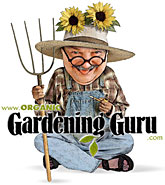Several days ago I left you hanging, or tried to, but perhaps a more aggressive approach would have worked better, viz:
So now I knew that, thank goodness, I didn’t need to dig up my damaged potatoes. Or did I? (scary music)
To recap: My last post contained the research results I’d found after a hail storm devastated my potatoes in July. According to several experts who’d conducted several studies, potatoes damaged earlier in the season recovered more completely, and had better yields, than those that were damaged later. This was a major relief to me, as it meant I could leave my potatoes, all of them fairly young, in the ground, and they’d continue to grow, albeit slowly.
Dee of Red Dirt Ramblings had suggested, quite reasonably, that I might want to get those potatoes out of the ground forthwith, but since this research indicated otherwise, I proceeded to a gleeful celebration, declaring that she was “wrong, wrong, wrong.” Now, that’s the sort of categorical declaration that in any tragedy would be recognized as hubris, and like pride, it goes before a fall.
All seemed well and good until I tried to find my sources amongst my bookmarks the evening I wrote that post, couldn’t, and therefore tried to reproduce the research. The same, magical key words brought up a weird mish-mash of stuff, including a listing for something called The Manic Gardener—what’s that?
Along with the studies I was searching for, one conducted in 1967, one in 1992, there were numerous references to a bad hailstorm in Colorado this past August, causing extensive damage to barley, wheat, and potatoes. (The end of my post contained a link to that newspaper article.)
According to the newspaper report, "Potatoes planted later in the season suffered the worst since their plants will spend part of the remaining growing season trying to regenerate leaves and vines.” Jim Ehrlich, executive director of the Colorado Potato Administrative Committee in Monte Vista, said that "The potatoes just won’t continue to bulk. It shouldn’t really be a quality issue but it is a size issue."
Hmm. Last time I checked, potatoes planted later in the season would be younger than ones planted earlier. So according to this, younger plants suffered more. Which directly contradicts the findings of the studies. And supports Dee’s suspicion that those potatoes were done growing, underground at least. So she wasn’t wrong, wrong, wrong.
Well, dang, dang, dang.
Maybe that’s why I’ve found almost nothing, the few times I’ve grabbled under those lush potato plants. Maybe they’re all leaf, and no tuber. Rats. Well, they should be ready to dig by the time I get home, and I promise to report honestly what I find, however painful.
And maybe I should send Dee half my miniscule potato harvest.
As for why one potato expert contradicts several others—beats me. Because that’s what experts do? Well, yeah; but in a case like this, I’d think there’d actually be an answer, you know, that old-fashioned thing called Truth or even its mundane, unassuming cousin Fact. Shows how much I know.

 Subscribe to RSS feed
Subscribe to RSS feed


